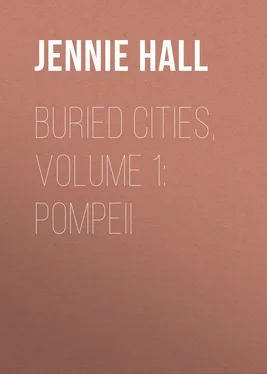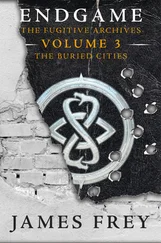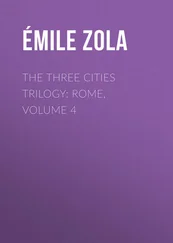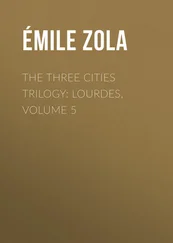Jennie Hall - Buried Cities, Volume 1 - Pompeii
Здесь есть возможность читать онлайн «Jennie Hall - Buried Cities, Volume 1 - Pompeii» — ознакомительный отрывок электронной книги совершенно бесплатно, а после прочтения отрывка купить полную версию. В некоторых случаях можно слушать аудио, скачать через торрент в формате fb2 и присутствует краткое содержание. Жанр: foreign_prose, История, foreign_edu, foreign_antique, на английском языке. Описание произведения, (предисловие) а так же отзывы посетителей доступны на портале библиотеки ЛибКат.
- Название:Buried Cities, Volume 1: Pompeii
- Автор:
- Жанр:
- Год:неизвестен
- ISBN:нет данных
- Рейтинг книги:5 / 5. Голосов: 1
-
Избранное:Добавить в избранное
- Отзывы:
-
Ваша оценка:
- 100
- 1
- 2
- 3
- 4
- 5
Buried Cities, Volume 1: Pompeii: краткое содержание, описание и аннотация
Предлагаем к чтению аннотацию, описание, краткое содержание или предисловие (зависит от того, что написал сам автор книги «Buried Cities, Volume 1: Pompeii»). Если вы не нашли необходимую информацию о книге — напишите в комментариях, мы постараемся отыскать её.
Buried Cities, Volume 1: Pompeii — читать онлайн ознакомительный отрывок
Ниже представлен текст книги, разбитый по страницам. Система сохранения места последней прочитанной страницы, позволяет с удобством читать онлайн бесплатно книгу «Buried Cities, Volume 1: Pompeii», без необходимости каждый раз заново искать на чём Вы остановились. Поставьте закладку, и сможете в любой момент перейти на страницу, на которой закончили чтение.
Интервал:
Закладка:
Jennie Hall
Buried Cities, Volume 1: Pompeii
BURIED CITIES
BY
JENNIE HALL
The publishers are grateful to the estate of Miss Jennie Hall and to her many friends for assistance in planning the publication of this book. Especial thanks are due to Miss Nell C. Curtis of the Lincoln School, New York City, for helping to finish Miss Hall's work of choosing the pictures, and to Miss Irene I. Cleaves of the Francis Parker School, Chicago, who wrote the captions. It was Miss Katharine Taylor, now of the Shady Hill School, Cambridge, who brought these stories to our attention.
FOREWORD: TO BOYS AND GIRLS
Do you like to dig for hidden treasure? Have you ever found Indian arrowheads or Indian pottery? I knew a boy who was digging a cave in a sandy place, and he found an Indian grave. With his own hands he uncovered the bones and skull of some brave warrior. That brown skull was more precious to him than a mint of money. Another boy I knew was making a cave of his own. Suddenly he dug into an older one made years before. He crawled into it with a leaping heart and began to explore. He found an old carpet and a bit of burned candle. They proved that some one had lived there. What kind of a man had he been and what kind of life had he lived—black or white or red, robber or beggar or adventurer? Some of us were walking in the woods one day when we saw a bone sticking out of the ground. Luckily we had a spade, and we set to work digging. Not one moment was the tool idle. First one bone and then another came to light and among them a perfect horse's skull. We felt as though we had rescued Captain Kidd's treasure, and we went home draped in bones.
Suppose that instead of finding the bones of a horse we had uncovered a gold-wrapped king. Suppose that instead of a deserted cave that boy had dug into a whole buried city with theaters and mills and shops and beautiful houses. Suppose that instead of picking up an Indian arrowhead you could find old golden vases and crowns and bronze swords lying in the earth. If you could be a digger and a finder and could choose your find, would you choose a marble statue or a buried bakeshop with bread two thousand years old still in the oven or a king's grave filled with golden gifts? It is of such digging and such finding that this book tells.
POMPEII
Line Art of Bronze Lamp. Caption: Bronze Lamps .
The bowl held olive oil. A wick came out at the nozzle.
These lamps gave a dim and smoky light.
THE GREEK SLAVE AND THE LITTLE ROMAN BOY
Ariston, the Greek slave, was busily painting. He stood in a little room with three smooth walls. The fourth side was open upon a court. A little fountain splashed there. Above stretched the brilliant sky of Italy. The August sun shone hotly down. It cut sharp shadows of the columns on the cement floor. This was the master's room. The artist was painting the walls. Two were already gay with pictures. They showed the mighty deeds of warlike Herakles. Here was Herakles strangling the lion, Herakles killing the hideous hydra, Herakles carrying the wild boar on his shoulders, Herakles training the mad horses. But now the boy was painting the best deed of all—Herakles saving Alcestis from death. He had made the hero big and beautiful. The strong muscles lay smooth in the great body. One hand trailed the club. On the other arm hung the famous lion skin. With that hand the god led Alcestis. He turned his head toward her and smiled. On the ground lay Death, bruised and bleeding. One batlike black wing hung broken. He scowled after the hero and the woman. In the sky above him stood Apollo, the lord of life, looking down. But the picture of the god was only half finished. The figure was sketched in outline. Ariston was rapidly laying on paint with his little brushes. His eyes glowed with Apollo's own fire. His lips were open, and his breath came through them pantingly.
"O god of beauty, god of Hellas, god of freedom, help me!" he half whispered while his brush worked.
For he had a great plan in his mind. Here he was, a slave in this rich Roman's house. Yet he was a free-born son of Athens, from a family of painters. Pirates had brought him here to Pompeii, and had sold him as a slave. His artist's skill had helped him, even in this cruel land. For his master, Tetreius, loved beauty. The Roman had soon found that his young Greek slave was a painter. He had said to his steward:
"Let this boy work at the mill no longer. He shall paint the walls of my private room."
So he had talked to Ariston about what the pictures should be. The Greek had found that this solemn, frowning Roman was really a kind man. Then hope had sprung up in his breast and had sung of freedom.
"I will do my best to please him," he had thought. "When all the walls are beautiful, perhaps he will smile at my work. Then I will clasp his knees. I will tell him of my father, of Athens, of how I was stolen. Perhaps he will send me home."
Now the painting was almost done. As he worked, a thousand pictures were flashing through his mind. He saw his beloved old home in lovely Athens. He felt his father's hand on his, teaching him to paint. He gazed again at the Parthenon, more beautiful than a dream. Then he saw himself playing on the fishing boat on that terrible holiday. He saw the pirate ship sail swiftly from behind a rocky point and pounce upon them. He saw himself and his friends dragged aboard. He felt the tight rope on his wrists as they bound him and threw him under the deck. He saw himself standing here in the market place of Pompeii. He heard himself sold for a slave. At that thought he threw down his brush and groaned.
But soon he grew calmer. Perhaps the sweet drip of the fountain cooled his hot thoughts. Perhaps the soft touch of the sun soothed his heart. He took up his brushes again and set to work.
"The last figure shall be the most beautiful of all," he said to himself. "It is my own god, Apollo."
So he worked tenderly on the face. With a few little strokes he made the mouth smile kindly. He made the blue eyes deep and gentle. He lifted the golden curls with a little breeze from Olympos. The god's smile cheered him. The beautiful colors filled his mind. He forgot his sorrows. He forgot everything but his picture. Minute by minute it grew under his moving brush. He smiled into the god's eyes.
Meantime a great noise arose in the house. There were cries of fear. There was running of feet.
"A great cloud!" "Earthquake!" "Fire and hail!" "Smoke from hell!" "The end of the world!" "Run! Run!"
And men and women, all slaves, ran screaming through the house and out of the front door. But the painter only half heard the cries. His ears, his eyes, his thoughts were full of Apollo.
For a little the house was still. Only the fountain and the shadows and the artist's brush moved there. Then came a great noise as though the sky had split open. The low, sturdy house trembled. Ariston's brush was shaken and blotted Apollo's eye. Then there was a clattering on the cement floor as of a million arrows. Ariston ran into the court. From the heavens showered a hail of gray, soft little pebbles like beans. They burned his upturned face. They stung his bare arms. He gave a cry and ran back under the porch roof. Then he heard a shrill call above all the clattering. It came from the far end of the house. Ariston ran back into the private court. There lay Caius, his master's little sick son. His couch was under the open sky, and the gray hail was pelting down upon him. He was covering his head with his arms and wailing.
"Little master!" called Ariston. "What is it? What has happened to us?" "Oh, take me!" cried the little boy.
"Where are the others?" asked Ariston.
Читать дальшеИнтервал:
Закладка:
Похожие книги на «Buried Cities, Volume 1: Pompeii»
Представляем Вашему вниманию похожие книги на «Buried Cities, Volume 1: Pompeii» списком для выбора. Мы отобрали схожую по названию и смыслу литературу в надежде предоставить читателям больше вариантов отыскать новые, интересные, ещё непрочитанные произведения.
Обсуждение, отзывы о книге «Buried Cities, Volume 1: Pompeii» и просто собственные мнения читателей. Оставьте ваши комментарии, напишите, что Вы думаете о произведении, его смысле или главных героях. Укажите что конкретно понравилось, а что нет, и почему Вы так считаете.












